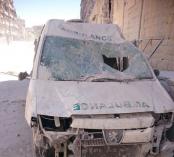
On Thursday November 22, Geneva Call launched a new Deed of Commitment that encourages armed non-State actors to refrain from inflicting violence on hospitals, health workers, patients and ambulances in accordance with the Geneva Conventions.
Many provisions of the Geneva Conventions, including their provisions against inflicting violence against health care facilities and personnel, are customary international humanitarian law. As such, they bind all parties to a conflict, including armed non-State actors. Even so, these groups may not understand the prohibitions or the nature of their obligations to abide by them. Geneva Call works to gain commitments from armed non-State actors to commit to and disseminate these norms, and inform and train their fighters to abide by them. Geneva Call asks armed groups to sign a Deed of Commitment to demonstrate their willingness and commitment to comply with Conventions and open themselves up to be held publicly accountable.
This most recent Deed of Commitment on protecting health care in armed conflict aims firstly “to ensure, maintain, and provide access for affected populations to essential health care facilities, goods and services, without adverse distinction” and secondly to “facilitate the provision of health care by impartial humanitarian organisations.”

Photo courtesy of the Syrian American Medical Society
In addition to developing these Deed of Commitments, Geneva Call provides guidance for armed non-State actors on how they may “incorporate international humanitarian law into their policies, codes of conduct, and other internal regulations.” The organization believes that training armed groups in international humanitarian law and engaging them in discussion is crucial to foster compliance.
Geneva Call works directly with armed non-State actors, and while this contact is mostly established through personal contacts and third parties, the organization notes that “a growing number of requests for opening dialogue come directly from armed non-State actors themselves.” When an armed group signs on to a Deed of Commitment, it is held accountable by a three-layered monitoring process that involves self-monitoring, independent monitoring and analysis by Geneva Call via third party sources and finally by field visits from Geneva Call.
The new deed includes 16 commitments, including:
- TO RESPECT AND PROTECT the wounded and sick, whether civilian or military, friend or enemy, in all circumstances. This includes not attacking, harming, or killing them; protecting them from unlawful treatment and pillage of their personal property; and providing them with the health care and attention required by their condition, based solely on medical grounds with the least possible delay.
- TO TAKE all possible measures to search for, collect, and evacuate the wounded and sick without delay or adverse distinction, including by allowing civilians and impartial humanitarian organizations to assist in these tasks.
- TO RESPECT AND PROTECT health care personnel engaged in the provision of health care. This includes not attacking, threatening, or pressuring those who provide health care; respecting the obligation of health care personnel to treat all wounded and sick persons without distinction on any grounds other than medical ones; and not otherwise unduly interfering with the work of health care personnel. It includes also not punishing health care personnel for performing medical duties and not compelling them to perform acts contrary to their medical ethics or to disclose information covered by medical confidentiality.
- TO RESPECT AND PROTECT health care facilities. This includes not attacking health care facilities performing medical functions, taking all feasible measures to spare health care facilities from the effects of attacks, and not depriving them from the vital resources needed for their functioning. It also includes facilitating the work carried out in health care facilities; refraining from any behavior that disrupts the functioning of health care facilities, in particular not using them for military or other non-medical purposes; and respecting the no weapon policy inside health care facilities.
We welcome the inclusion of protecting health in conflict to Geneva Call’s Deed of Commitment and we hope that armed non-State actors will take seriously the importance of respecting and protecting health in all conflicts.

